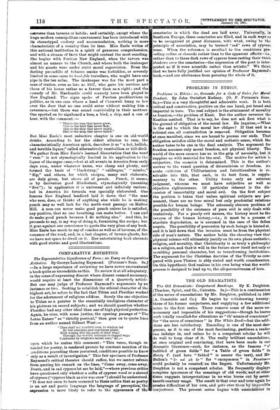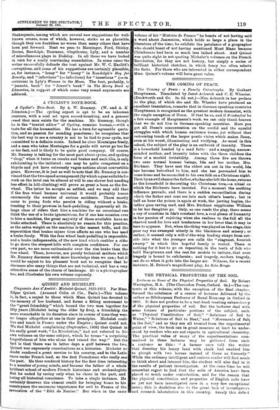TEE OLD DRAMATISTS.
The Old Dramatists : Conjectural Readings. By K. Deighton. (Thacker, Spink, and Co., Calcutta. 5s.)—This is a continuation of the series of emendations by Mr. Deighton, published in 1896 (A. Constable and Co.) He begins by withdrawing twenty- three of his former conjectures, and supplying a few additional notes to the first series. These remove some of the more un- necessary and impossible of his suggestions—though he leaves such totally uncalled-for alterations as " th' amaze of conscience" for "the maze of conscience" in The White Devil—but the addi- tions are less satisfactory. Emending is one of the most dan- gerous, as it is one of the most fascinating, pastimes a reader can indulge in, and unless he is a competent scholar he will do well to keep clear of it. The really brilliant emendations, at once original and convincing, that have been made in our dramatic literature—such, for instance, as the famous " babbled of green fields" for "a Table of green fields" in Henry V. (and here " fabled " is nearer the text), and Mr- Bullen's "iv eat sib " for " oncaymceon " in Faustus could probably be counted] on the Angers. Unfortunately Hr. Deighton is not a competent scholar. He frequently displays complete ignorance of the meanings of old words, and at other times suggests interpretations in no wise borne out by seven- teenth-century usage. The result is that over and.over again be creates difficulties of his own, and gets over them by impossible conjectnres. The present series begins with emendations in Shakespeare, among which are several new suggestions for well- known cruxes, none of which, however, strike us as plausible, though they are doubtless no worse than many others that have been put forward. Next we pass to Messinger, Ford, Shirley, Brome, Randolph, Tourneur, Glapthorne, Lyly, and a number of miscellaneous plays in Dodsley. In all these we have looked in vain for a really convincing emendation. In some cases the writer successfully defends the text against Mr. W. C. Hazlitt's corruptions, and some of his suggestions are certainly plausible, as, for instance, "lousy" for " bousy " in Randolph's Hey for Honesty, and " infestious " (= infectious) for " insestious " (--,--- in cestuous) in Lyly's Woman in the Moon. The best, probably, is " jennets, bauk " for " Jenert's bank" in The Merry Devil of Edmonton, in support of which some very sound arguments are adduced..



















































 Previous page
Previous page